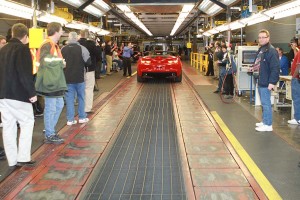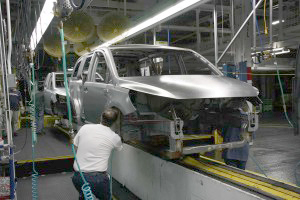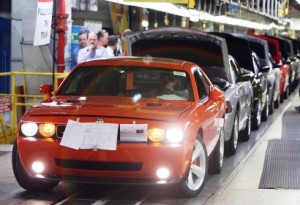Union workers in Canada have overwhelmingly authorized union leaders to call a strike next month as contract talks with Detroit’s Big Three automakers race towards their deadline.
Negotiations have turned contentious in recent weeks as the two sides struggle to find common ground amidst conflicting demands. Unifor, the union representing thousands of Canadian auto line workers, wants General Motors, Ford and Fiat Chrysler to commit to new investments that would keep the country’s auto plants open. But the Detroit makers are, in turn, demanding cost cuts they claim are necessary to remain competitive.
Workers voted almost unanimously to approve strikes, and “With this clear mandate our members have demonstrated they are in full support of their bargaining committees and our direction in this set of negotiations,” said Unifor President Jerry Dias.
At Fiat Chrysler Automobiles, 99.0% of workers authorized a strike. At Ford, the vote was 98.9%, and GM was only a shade behind, at 97.1%. That doesn’t mean there will be a strike, however. It simply gives union negotiators a stronger hand as the talks head into the final weeks before an 11:59 PM deadline on September 19th.
“The push for new investments in Canada got a lot stronger today,” Dias said in a union statement.
Canada’s auto industry has been suffering a slump in recent years, in part due to concessions made by union workers in the U.S., who have taken a number of steps over the past decade to improve the industry’s competitiveness.
That downturn is particularly apparent at the Oshawa Assembly complex operated by GM just outside Detroit. As recently as 2005 the plant employed 11,000 hourly employees. Today, that’s down to 2,400, and there’s growing concern about the factory’s future since the maker moved production of the Chevrolet Camaro from Oshawa to a plant in Lansing, Michigan last year.
The Ontario facility still builds a number of important products for GM, including the Buick Regal, Cadillac XTS, Chevrolet Impala and Chevrolet Equinox, but that latter SUV is currently scheduled to end its production run next year. GM has so far refused to commit to building a new version of the Equinox in Oshawa. The remaining models are scheduled to either be replaced or be phased out by 2019.
(Canadian union leaders warn GM a strike is coming. Click Here for more.)
There are plenty of concerns about the future at Fiat Chrysler’s Canadian plants, as well. Bowing to a major shift in the market, CEO Sergio Marchionne has already committed to dropping several U.S. –made passenger cars, the Dodge Dart and the Chrysler 200. There are concerns now about what might happen to Canadian-made models, such as the big Chrysler 300.
FCA did make a major investment across the border when it spent over $1 billion to upgrade the factory in Windsor, Ontario building the all-new 2017 Chrysler Pacifica minivan, but during a conversation with reporters last Friday, Marchionne cautioned that, “I make no comment about what the requirements are for Brampton going forward.”
That is the Detroit maker’s other major Canadian facility, employing 3,300 hourly workers to produce the Dodge Charger, Dodge Challenger and Chrysler 300. Fiat Chrysler officials have suggested they could, if necessary, move production of the 300 sedan to the Windsor minivan plant.
(Marchionne pushes for FCA manufacturing revival. Click Here for the story.)
Ford could also shift production out of Canada, notably by closing or paring back production at its big Windsor, Ontario engine plant.
As is the case with the U.S. auto industry’s big labor group, the United Auto Workers Union, Unifor plans to shift gears and focus on one manufacturer in the final push for a contract. It expects to announce this so-called strike target on September 6th. Negotiations with the other two makers would be put on the back burner until there’s a contract with the lead manufacturer. That agreement would then be used as an industry pattern.
As in the U.S., Unifor has faced increasing challenges to its power over the years, in part due to the emergence of non-unionized “transplant” assembly plants operated by an assortment of Asian automakers across Canada.
The current round of talks will be a real test for the union which was formed three years ago by the merger of the Canadian Auto Workers and the Communications, Energy and Paperworkers unions.
(Click Here for details about the promises the UAW has secured from Hillary Clinton.)



